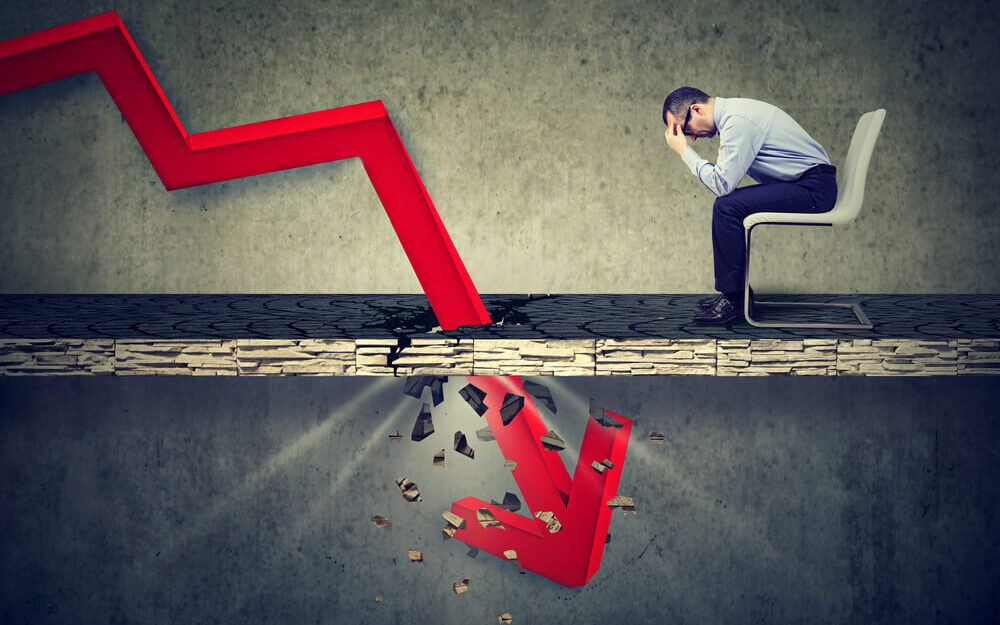There’s no doubt that the stock market is doing quite well right now as climbs higher and higher seemingly every day, but there are some worries on the horizon that could bring it all crashing down.
It seems like nothing is scaring investors on Wall Street. Inflated valuations, ballooning debt and growing geopolitical instability have been shrugged off. But as fearless, irrational investing takes over the chances of a crash only grow.
Here are three warning signs that are signalling a market crash in 2020.
The Global Debt Crisis
Permabear Jim Rogers has been predicting a coming bear market for a while now, and he thinks it will be the “worst in my lifetime,” and Rogers thinks it will be driven by ballooning global debt, per CCN:
In 2008 we had a problem because of too much debt. Since then the debt everywhere in the world has skyrocketed. The Federal Reserve, the central bank in the US increased its balance sheet by 500% in 10 years. That alone is an unbelievable statement.
The World Bank, in it’s bi-annual Global Economic Prospects report, has also noted that borrowing around the world has risen to the highest level it has seen in 50 years. The debt is more manageable because of lower interest rates (which are even negative in some places like Japan), but the bank didn’t rule out financial crisis. Emerging economies are especially vulnerable with total debt reaching 170% of GDP in 2018.
Per the World Bank report:
Since the global financial crisis, another wave has been building, with both global debt and debt in EMDEs reaching all-time highs. The latest wave has also seen the largest, fastest and most broad-based increase in debt in EMDEs. Historically, episodes of rapid debt accumulation have often been associated with financial crises.
Investors Are Way Too Optimistic for the US Stock Market
Deutsche Bank analysts think that investors are betting way too hard on a global economic rebound after uncertainty scares throughout 2019, and various metrics are stretched very thin.
“Equity positioning, like the market itself, has run far ahead of current growth as investors price in a global growth rebound,” Deutsche Bank analysts Parag Thatte, Srineel Jalagani and Binky Chadha said.
That points to an incoming sell-off. The last time exposure was this high (or higher) was in January 2018, right before a February sell-off that saw the S&P 500 drop 10%.
Chadha sees the S&P 500 finishing 2020 at 3,250, which is only slightly below where it sat Tuesday morning. His main reasoning for this is the stretched valuations, which he doesn’t think will be able to sustain the record-breaking bull market through 2020.
Rising Geopolitical Tensions
The end of 2019 had two major breakthroughs that eased investor’s minds a bit: A phase one trade deal (however small) between the U.S. and China, and Boris Johnson’s sweeping win in Parliament setting a course for Brexit to finally be resolved.
But that didn’t last long as tensions between the U.S. and Iran have now ramped up in the past few weeks. Iran announced Tuesday it was arresting dozens in connection to a accidental missile strike that took down a Ukrainian passenger jet, killing 176 last week.
Even after admitting fault, Iranian President Hassan Rouhani blamed the U.S. as the root cause for the accident, according to the state-controlled news agency Tasnim.
“It was the U.S. that caused such an incident to take place,” Rouhani said.
There hasn’t been a reported U.S. response to this new development, but tensions are still present in the region, and that means investors could get nervous at some point and bail out of the markets.
The U.S.-China trade war is far from over as well. A phase one deal is slated to be signed in Washington on Wednesday, but there are still many unresolved issues to be negotiated. And Rogers doesn’t think anyone really wins.
“Historically, trade wars have always been a disaster,” Rogers said. “No one has ever won a trade war (…) Trade wars frequently, or often, have led to real wars. It makes sense, you start slapping someone in the face and you slap them again and you slap them again (they’re going to fight back.) I mean they have to.”
Volatility rocked the markets in 2019 when new developments between the world’s two largest economies broke, and that will probably continue in 2020, especially if people are eyeing profits in the record bull market.
